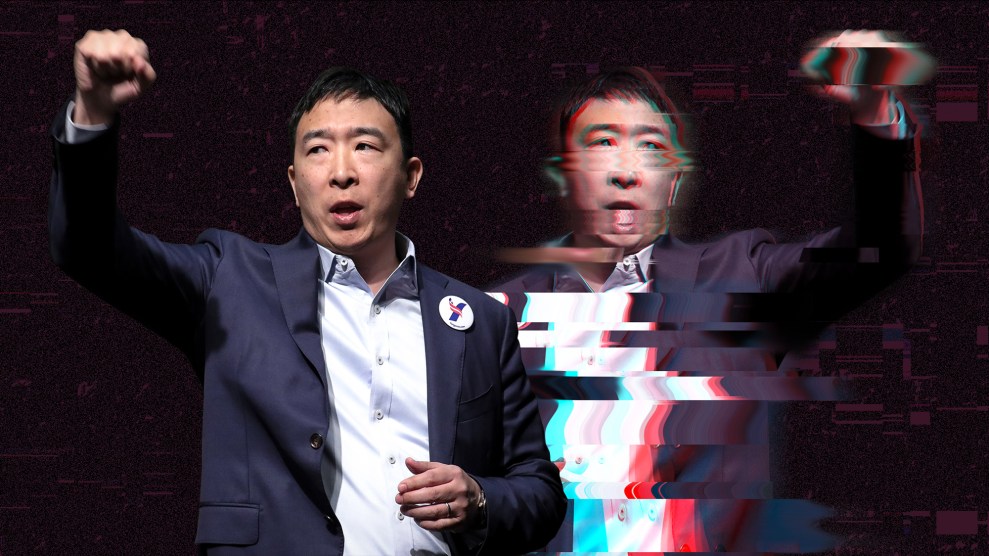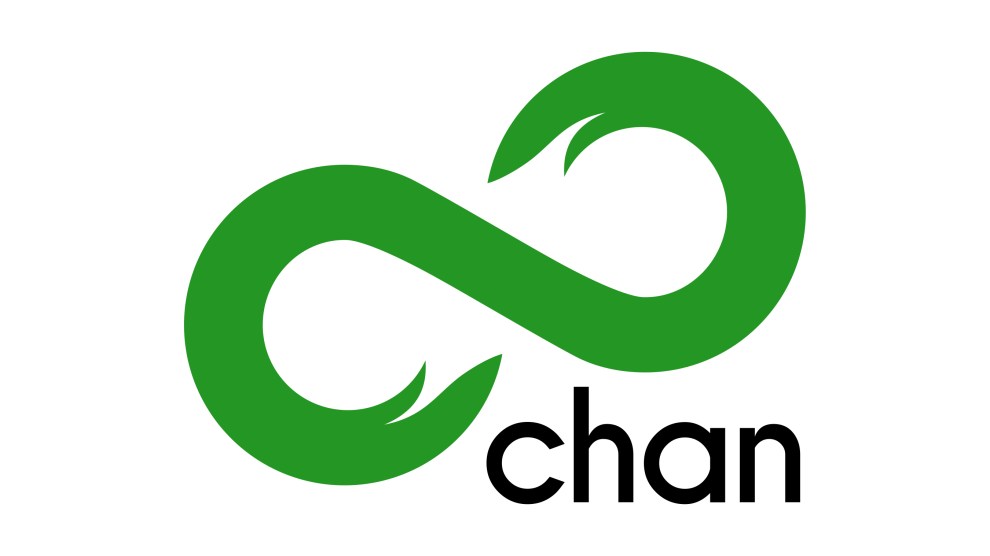
Mother Jones illustration; Drew Angerer/Getty
Last month, Andrew Yang’s presidential bid emerged from out of nearly nowhere onto the 2020 Democratic debate stage in a matter of days.
Until March 4, the hashtag #YangGang had been quietly floating around Twitter, only occasionally garnering a peak of just hundreds of daily mentions. But on that day it spiked into the thousands, according to metrics shared with Mother Jones and compiled by Zach Verdin, a partner at the pro-democracy independent research collective Guardians.ai.
Verdin hypothesized that 4chan’s /pol/, a discussion board notorious for being a watering hole of racist and sexist trolls, was responsible for the so-called Yang Gang’s Twitter explosion. Immediately before the hashtag went viral, people boosting Yang flooded the board with absurdist, neon pink vaporwave memes backing his campaign and its centerpiece proposal to provide every American a monthly $1,000 universal basic income.
While Yang and his campaign have disavowed racist backing, unsavory elements of his online support have seized on tweets he’s sent that raise questions about white demography, and have reframed his central campaign plank as a tool to punish undocumented immigrants living in the United States and deter others from coming. Yang’s campaign has argued that the eruption of support on 4chan took place without their prodding, but it came in the days and weeks after he appeared on actor Joe Rogan’s widely heard podcast, which has hosted multiple guests associated with the alt-right, and Tucker Carlson’s Fox News show. Both are popular on the message board and in other right-leaning online spaces.
While 4chan boosted Yang’s climb on the Democrats’ 2020 ladder by helping generate enthusiasm and exposure to net enough small donations to meet the party’s threshold for the first official debate, it has also become a theater for sloppy infighting over the dark-horse candidate. Threads started by Yang supporters are full of others going at it over his candidacy and policies. The board’s anti-Yang holdouts have started calling the site’s pro-Yang emissaries “shills,” and pointed out the coordinated efforts from Yang Gang members to flood 4chan with pro-Yang posts and memes:
“Do ctrl-f and search for ‘/pol/’, they advertise the threads they make to each other so they can comment and make it look like Yang has a lot of supporters,” one poster wrote, explaining to others how to see evidence of the coordination themselves by searching archives of pro-Yang Discord group chats.
That 4chan user’s warning isn’t a conspiracy. Organized Yang groups have used Discord, a chat service, to stage deliberate raids on 4chan to evangelize for the candidate. The online battles have given rise to real-world harassment after 4chan users doxxed and harassed Carly Reilly, the Yang campaign’s deputy chief of staff, over unproven claims, denied by the campaign, that she led efforts to manipulate 4chan into supporting Yang.
Searching for /pol/ or “4chan” on two pro-Yang Discord servers returned dozens of results, often accompanied by calls for users to create or post in threads about Yang. “OK. The NZ thing has died down. It’s definitely time to spam pol again,” one member of the Yang Gang 2020 Discord server wrote a week and a half after 50 Muslim worshippers were killed in New Zealand. “I’m gonna make a few threads. I’ll link them.”
One 4channer involved, who asked to go by Louis, is the creator of a pro-Yang Discord that boasts over 400 members. He said his strategy in flooding 4chan was aimed at helping the site’s users share and create memes and videos boosting the campaign.
Unlike Yang, Louis, who wouldn’t reveal his identity out of fear of the implications of being associated with nationalist politics, doesn’t draw a line on who is welcome into the Yang Gang, even if he personally finds their views abhorrent. Muslims, Asians, and black people are all welcome along with the kinds of people who would condone their murders—just so long as they don’t talk about it. (His Discord has a rule against promoting violence.)
“To categorize this group as any one thing is not accurate. There are libertarians, fascists, national socialists, communists, and even a few capitalists,” Louis said. “I need you to be careful on how you quote me on this because I’m building a big tent here. I don’t want people who think of [the New Zealand shooter] as somebody who is doing the right thing to be at odds with us.”
Louis is, by his own description, an unlikely candidate to run a Yang Discord targeting 4chan. While many imagine Yang’s internet supporters to reflect the underemployed or student-heavy demographics of younger internet posters, Louis says he’s a middle-aged man in North Carolina who makes an “upper-middle-class income.”
“This has nothing to do with me wanting $1,000 a month,” Louis said, explaining that he wants a UBI not for himself but because he “cares about people.”
The communities of 4chan and 8chan, especially after the 2016 elections, have earned a reputation as virulently racist and sexist hubs for the alt-right. Alongside hateful memes and posts, you’ll find a range of firmly right political opinions, including white nationalists, white supremacists, fascists, libertarians, or users identifying with or expressing some mashup of ideologies.
Yang has also attracted a diverse and sometimes chaotic group of adherents. Beyond the centrist Democrats and Silicon Valley liberals Yang has wooed through traditional campaigning, he’s garnered support among white nationalists, self-described white identitarians, and white supremacists. The groups either mildly disagree with the others or outright hate them.
“Messy is an understatement,” said Louis, pointing to one 4chan thread where white supremacists and white nationalists viciously debated whether Yang’s politics had the potential to start a “white revolution.”
The dynamics are convoluted and have left many observers and potential Yang allies confused. In a video about Yang supporters, for example, Infowars’ Millie Weaver inaccurately described a Yang Gang Discord as a “leftist troll farm,” despite the members of the group politically aligning much closer to Infowars‘ own Alex Jones and his right-wing brand of conspiracy politics.
For all the infighting, there seem to be two areas where Yang’s fringe internet supporters align—in what they see as his nods to white identity politics, which they interpret as his openness to white nationalism, and his plan for universal basic income, which they frame as a tool for white nationalism.
To Louis and other alt-right Yang supporters, his UBI plan would not only help people who are suffering economically, but since it would only go to citizens, they excitedly claim it could create a “digital border wall.” Critics of Yang’s UBI plan have noted it could increase inflation, but to Louis and others, that’s another bonus: If everything costs more and only American citizens have access to UBI, then undocumented immigrants will have less economic incentive to come to the United States.
When asked about this element of his support, Yang’s campaign pushed back sharply, pointing out that Yang is the son of Taiwanese immigrants and that he has no intention of harming or “negatively impacting” immigrants in any way. His campaign website endorses the DREAM Act and a “Make Them Earn It” pathway to citizenship.
But such statements haven’t dissuaded racist supporters. White nationalist Discord communities, Yang groups, and 4chan supporters have seized on two Yang tweets addressing the demographic future of white people in America as evidence that he gets their white nationalist worldview:
Deaths now outnumber births among white people in more than half the states in the country. Much of this is low birth rates and white men dying from substance abuse and suicide. Our life expectancy has declined for 3 years. We need to do much more. https://t.co/zFRAkFY7FU
— Andrew Yang (@AndrewYang) February 15, 2019
America is set to become majority minority by 2045. That’s 27 years from now. This will be a truly dangerous time particularly as we are decimating the most common middle class jobs (e.g. retail, truck driving etc). Economic stress adds to social polarization and violence.
— Andrew Yang (@AndrewYang) October 28, 2018
The tweets hit on the exact type of issues white nationalists care about: their perception that white people are becoming increasingly threatened.
In an interview with Mother Jones, Yang denied any intent behind the posts to pander to or stoke support from racist communities. “I spend literally zero time on Discord chats. So I have no idea how various things are being interpreted,” he said. Addressing the February post, he said “it was me tweeting a New York Times article with that stat. Look, people are dying more than they’re being born in other parts of the country. This is something we need to take seriously. I’m concerned about any American having health problems and any communities that are suffering from massive public health concerns.”
He said his October tweet about the country’s coming demographic flip was predicated on a concern that as the country becomes more diverse, it’s not necessarily becoming more welcoming.
“Demographers have long known we’re heading to a majority nonwhite country. We’ve had this belief that as we become more diverse we’ll become more tolerant,” he said. “Tolerance might not accompany racial diversity. It might unfortunately result in increasing tensions. If you have people struggling with scarcity, they become open to hateful ideologies.”
Regardless of Yang’s stated intent, the posts have pulled in white nationalists like Richard Spencer and Nick Fuentes, who have retweeted them or signaled their support of him.
Trumpism was the fantasy that America can be we saved. Yangism is the awareness that it can't. https://t.co/H3rUe3FZIZ
— Richard ☀️ Spencer (@RichardBSpencer) March 8, 2019
Understanding Yang Gang:
1. The country is doomed
2. The rules don’t matter
3. We might as well get $1,000 a month— Nicholas J. Fuentes (@NickJFuentes) March 13, 2019
Their pro-Yang sentiment has trickled down into the white supremacist rank and file, according to leaked Discord chat logs published by the left-wing media nonprofit Unicorn Riot.
White nationalist and adjacent communities’ support of Yang is also partly driven by a decline in their support of Trump as they’ve grown disappointed with his presidency and, in their words, want a better deal.
In a video on Yang, Fuentes, a white nationalist online media figure, said that Trump’s “brash ‘big league’ type stuff was charming, I’ll admit, in 2016. It was funny to see somebody go up [and say] ‘I have the best words ever,’ and that type of stuff, but Andrew Yang exposes the shortcomings of that.”
“Maybe the outcome of Yang—maybe he doesn’t win the nomination, maybe he doesn’t even come close to the White House, but he forces the Democratic nominee to have a position on automation,” Fuentes continued. “If that is all that’s achieved, it will have been a great victory.”
“I feel that Trump sold us out,” Louis, the Yang Discord founder, said bluntly, before framing some participants’ support of Yang as an attempt to pressure the president. “There is a decent amount of people involved [in the Discord server] that just want to agitate for a better deal. If he thinks we’d abandon him perhaps he will do more for us.”
Despite these backers, Yang has explicitly forsworn support from anyone who supports white supremacy and white nationalism, a message he reiterated to Mother Jones. “I’ve already disavowed any racist and hateful ideologies. I don’t want their support,” he said, urging anyone curious about him to review his policy platform. “They reflect progressive policies up and down. No one has to guess what I stand for.”
While Yang says he’s surprised by his popularity on the darker corners of the internet, not everyone is convinced that it happened without some degree of conscious nurturing. Yang’s popularity with the crowd was preceded by his appearances on podcasts popular with the types of people who hang out on 4chan, including Rogan’s, and one hosted by Sam Harris, a moral philosopher and polemicist who trained as a neuroscientist. Beyond his appearance on Carlson’s Fox News show, he’s also taped a conversation with right-wing internet personality and podcaster Ben Shapiro.
“There’s something signaling there,” said Danielle Lee Tomson, who researches technology and populism at Columbia’s School of Journalism. “I don’t know of other candidates who go on Joe Rogan. Yang is definitely targeting these concepts and ideas that are salient in the ‘Intellectual Dark Web‘ and internet cultures adjacent to it,” she continued.
The Yang campaign’s communications director, Madalin Sammons, denied the appearances were any sort of attempt to court elements of the hosts’ audiences, and are of a piece with the long-shot candidate’s thirst for media attention.
“It is very difficult when you’re running for president and don’t get attention from the mainstream media. Whatever media he could get to spread his message, he would do. It was not signaling. It was: How do we spread the message in an unconventional way?” she said. “We are in a place where we are more aware of the media hits that we choose, but we’re not going to shy away from tough questions and tough situations.”
















